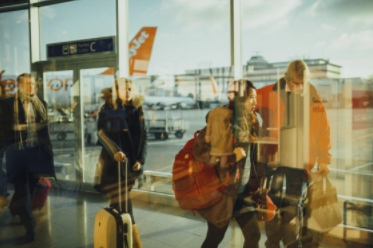As your international adventure slowly comes to an end, chances are you want to pick up items that you’ll be bringing back home with you. In order to legally bring items back into your native country, you’ll be required to complete a customs declaration form. This must be completed before you meet with Customers and Border Protection for your interview and to review your passport.
Vagabondish is reader-supported. When you buy through links on our site, we may earn a small affiliate commission. Read our disclosure.
When you pass through an international border, a Customs and Border Protection officer will ask about the items that you’re bringing back with you to. To make this process easier, it’s best to plan ahead. Here are 7 tips to make dealing with international customs a breeze.
#1: Register Valuable Items
If you are traveling internationally with high-value items, you will want to register them with your home country before jetting off to your destination. Items to considering registering include:
- Laptops
- Cameras
- Jewelry
Registering these items at home serves as proof to the Customs and Border Protection officers that you owned these items before traveling. This will save you a lot of trouble and time once you get back home.
If you’re worried about any particular items, you may want to take the extra step of investing in travel insurance to cover your precious items. Take your time and do your research to make sure you’re getting travel insurance that actually covers you as a citizen of your native country. For example: An Australian is going to need travel insurance for Australians, where an American is going to need travel insurance for U.S. citizens.

#2: Know the Regulations
Every country has different customs regulations. Before you head off to your destination, be sure that you know which items you can and cannot bring back. Most countries have a published list of which items are and are not prohibited. For example in the UK travelers aren’t allowed to bring items such as rough diamonds, food products, and obscene materials back into the country. Other countries require certain taxes or duties to be paid on select items brought back into the country.
#3: Create a Packing List
Before heading out on your trip, create a detailed list of all of the items that you’ve packed with you including clothing, shoes, jewelry, and other accessories. This not only helps when it’s time to pack all of your items back into your suitcases, this list will also come in handy when you need to make note of which items you’ve purchased during your trip.
Be sure to have your customs declaration form handy when you’re packing to ensure that you don’t miss writing down a certain item. No matter how big or small the items, you’ll want to list everything.
#4: Save All Receipts
When packing your bags, be sure to bring an envelope or a small plastic bag with you so that you can store all of your receipts. Anything you buy during your trip and plan to take back, you’ll want to have proof of purchase. Receipts not only help when filling out your customs paperwork, receipts are also useful in the event that a Customs agent has questions about an item that you’ve brought back into the country.
#5: Pack Purchases Separately
Before heading to the airport to go home, you’ll want to purchase a bag where you can pack everything that you’ve purchase during your trip. This way if a Customs agent asks to see all of the items, you have easy access to them. Packing items that you’ve bought in your checked baggage presents a huge problem. Your best bet is to pack them in a carry-on bag so that the items are with you throughout every leg of the trip.
#6: Don’t Pack Food
During your vacation, chances are you’ll come across some awesome new foods that you’ll want to bring back home with you. As tempting as it may be to pack fruits, vegetables, meats, and snacks in with your luggage, you’ll face all sorts of hassle when traveling with food. Many countries have strict rules and regulations when transporting food. Your best bet is to eat the food you planned to bring with you before you step foot into the airport. Otherwise you’ll be forced to throw most, if not all, of it away.
#7: Avoid Farms
As tempting as it may be to see some of the local animals up close and personal, interacting with farms and other agricultural locations can make passing through customs even harder. Customs agents are responsible for preventing germs and agricultural pests from making their way into the country. This means that if you visited a farm, you’ll likely be subject to extra screenings. Customs will need to potentially disinfect anything you’re wearing while also taking other precautionary measures to ensure you haven’t brought pests into the country.
Conclusion
Dealing with international customs can ruin your vacation vibes. To end your trip on the best note possible, take time to prepare for dealing with customs. This way you can avoid the hassle and headache of bringing items into your home country without taking the proper legal route.


